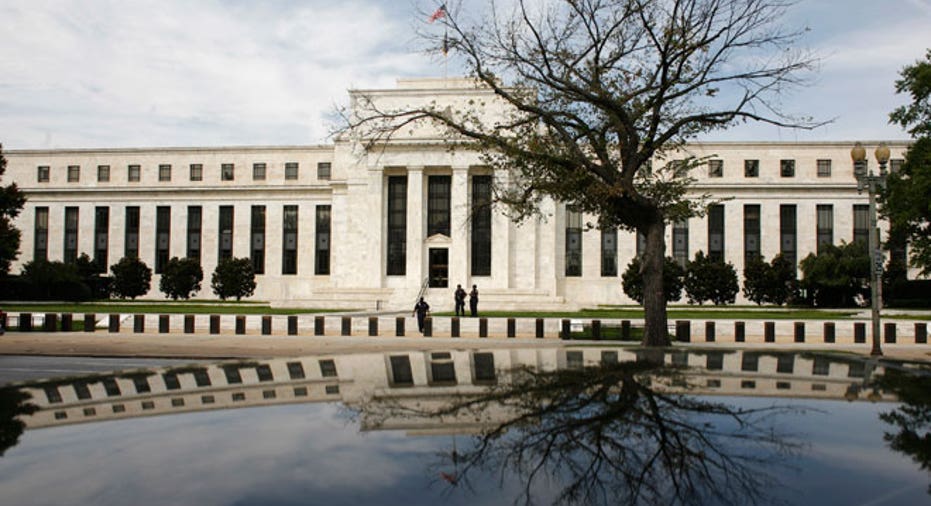As Fed Ponders QE3, Unintended Side Effects Loom

As the financial world eagerly awaits new hints of quantitative easing from Fed chief Ben Bernanke at Jackson Hole on Friday, some economists are pushing back against ultra easy-money policies.
In a paper posted by hawkish Dallas Fed President Richard Fisher this week, an OECD official warns that super-low interest rates and QE may not be all that effective and can actually have unintended consequences in the long term.
“Ultra-easy monetary policies can eventually threaten the health of financial institutions and the functioning of financial markets, threaten the ‘independence’ of central banks, and can encourage imprudent behavior on the part of governments,” William White, chairman of the OECD’s Economic Development and Review Committee, wrote in the paper.
Since the start of the financial crisis of 2008, the Federal Reserve has flooded the financial system with easy money by slashing interest rates to record lows and through QE. The Fed successfully prevented the U.S. from falling into a depression, but its ability to encourage a sustainable recovery hasn’t panned out as well.
With the U.S. gross domestic product slipping to 1.7% in the second quarter and Europe’s economy in shambles, calls have grown for the Fed to step in with a third round of QE aimed at keeping the recovery afloat.
Would QE3 Even Work?
Some are hoping Bernanke uses his annual speech in Jackson Hole, Wyoming, on Friday to make the case for QE3, as he has done in the past.
“There is a vigorous debate within the Fed and outside the Fed about what to do here,” said Josh Feinman, global chief economist at Deutsche Bank’s (NYSE:DB) DB Advisors.
White conceded the Fed’s early actions were “rightly and successfully directed to restoring financial stability,” but he lays out some warnings about continued action.
First, White argues the ultra-low interest rates may not really be seeping through to the broader economy right now.
There are “significant grounds for believing” the avenues that monetary policy normally operate “are at least partially blocked,” he wrote. For example, while the cost of borrowing has tumbled, some rates remain higher than one would expect given the level of QE.
White also pointed to a moderation in the positive impact in stock prices following each round of QE.
Even if all the Fed intervention successfully sent stocks soaring, White said the “wealth effect” argument -- that rising asset prices caused by low rates will lead to more consumer spending -- “needs serious reevaluation.”
Unintended Consequences Loom
At the same time, the paper highlights the potential drawbacks of ultra-easy monetary policy that may only become evident later, such as the unintended creation of asset bubbles.
For example, White points to the extraordinary easing by central banks since the mid 1980s to preempt downturns, such as after the ’87 stock market crash, or to respond to mitigate the recessions of 2001 and 2008.
“What cannot be ignored is the possibility that each of those actions simply set the stage for the next ‘boom and bust’ cycle, fueled by ever declining credit standards and ever expanding debt accumulation,” White said.
Feinman acknowledges that a Fed-induced credit bubble could emerge, but at this point “there’s very little evidence the private sector has gone on a credit binge.”
In fact, there’s ample evidence that people are reluctant to borrow and banks are hesitant to lend.
Letting Lawmakers Off the Hook?
Perhaps the biggest potential unintended consequence spelled out in the White paper deals with the impact on governments.
Not only can such easy money threaten central banks’ “independence in the pursuit of price stability,” but they can foster “false confidence in the sustainability of” governments’ fiscal position, White said.
In other words, the Fed’s desire to keep interest rates super low has also kept the heat off of lawmakers to address the U.S.’s deepening fiscal trouble. The eurozone crisis has repeatedly showed tough decisions are put off until rates rise to unsustainable levels.
What if Washington, not feeling pressure from the bond markets, doesn’t act to resolve the fiscal mess?
“If governments do not use this time wisely, then the ongoing economic and financial crisis can only worsen as the unintended consequences of current monetary policies increasingly materialize,” said White.
No Easy Choices
It doesn’t seem like a coincidence that Fisher, a critic of current Fed policy, decided to post the paper just days before the Jackson Hole summit.
“I think the Dallas Fed is making an intellectual contribution here,” said Jim Rickards, a partner at New York-based hedge fund JAC Capital Advisors. “They’re right to be skeptical and point out the potential flaws and unintended consequences of monetary easing.”
Ultimately, White’s warnings underscore the difficult spot the Fed is in. It must simultaneously try to encourage economic growth and guard against unintended side effects that won’t emerge until later.
“Suppose your house is on fire and someone says, ‘Don’t turn the water hoses on because you may cause flooding down the road,’” said Feinman. “But if you don’t turn the water hoses on, your house will burn down.”



















